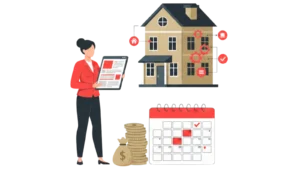Table of Contents
The rise of vacation rental platforms such as Airbnb and Vrbo has created new opportunities for homeowners and short-term property managers. However, these opportunities come with new problems, particularly in terms of complying with ever-changing rules. These short-term rental laws differ greatly by state. In fact, they differ from state to state, city to city, and even neighborhood to neighborhood.
Property managers must stay aware of these regulations to prevent legal complications and penalties. In this article, we will talk about everything you need to know as a business owner, including the need for regulations and how to navigate it.
What is a Short-Term Rental?
A short-term rental commonly refers to a residential home unit or accessory building that the owner rents for a brief period. The typical duration here is less than 30 days. However, it varies based on the location and jurisdiction.
Depending on the location and the organization involved, short-term rentals may refer to them as transitory, vacation, or short-term rentals.
Why is it Necessary to Regulate Short-Term Rentals?
Regulations are important for every industry, and the vacation rental field isn’t an exception. Short-term rental regulations are important to protect the interests of both the property managers and guests. It also ensures that the irregular flow of short-term tenants doesn’t negatively impact the local community.
Adhering to the mandated regulations helps you ensure a safer and more enjoyable experience for your guests. It also minimizes potential conflicts with neighbors and community associations and helps you avoid fines.
Furthermore, many regulations are intended to foster healthy competition among business participants and provide a level playing field for all parties concerned. This means that you can help shape the future of the short-term rental market while maintaining a successful and sustainable business by remaining educated and engaged.
Do Short-Term Rental Laws By State Vary Between Jurisdictions?
There is no one-size-fits-all approach to rules, and knowing your local and state regulations is vital for the success of your organization. Not just rules, even the definition of short-term rental property varies depending on where you live.
Depending on the jurisdiction, these properties can be classified as whole homes, accessory residences, or individual rooms, with different rules and regulations relating to each category. For example, owner-occupied housing is one in which the owner uses the property as their primary residence more than 51% of the time. Otherwise, the home is classed as non-owner-occupied housing.
Some jurisdictions distinguish between single-family and multi-family dwellings, while others distinguish between short-term rental properties in residential vs commercial or mixed-use zones. Furthermore, several states restrict the number of short-term rentals permitted inside a jurisdictional area.
With so many differences, it’s critical to examine the websites of your state and local governments for particular information on how short-term rentals are defined in your region.
What are the Short-Term Rental Laws by State in the US?
Aside from identifying a short-term rental in terms of structure and length of stay, vacation rental operators must also consider additional regulatory constraints. These will most likely vary depending on area, but common legal constraints include:
Type of Property
In some cities, short-term rentals are not permitted in any way. On the other hand, in some cities, there may be limits on which zones or locations can and cannot be used for vacation rentals.
In Los Angeles, hosts who post their house on Airbnb can only rent it out if it is their primary residence. Furthermore, unless they pay additional taxes and acquire special permission from the city, homeowners are confined to renting for only 120 days each year.
Number of Vacation Rentals
One of the most prevalent legislative short-term rental restrictions is a cap on the number of vacation rentals in a given area. This is especially true in major cities and popular tourist locations, where concerns about overpopulation or needing more permanent accommodation may exist.
In Honolulu, Hawaii, for example, a new regulation limits the number of permitted rentals to 1,715. Several cities completely outlaw short-term rentals. There may also be location-specific restrictions, such as hosts in Los Angeles only being able to post their primary house as a short-term rental.
Cap on Number of Bookings Per Year
One common rule is that property managers can only take a certain number of bookings yearly, like no more than 36 reservations. They can still have guests stay for as long as they want, but they can only book several times.
Another thing is “grandfathering.” This means that only new vacation rentals have to follow these rules. Older ones don’t have to change how they operate—they can stick to the old rules or might not have any rules at all.
Multiple Dwelling Laws
In cities such asNew York, where the Airbnb effect has been said to raise rent costs for local residents, laws such as theMultiple Dwelling Law prohibit short-term rentals of less than 30 days in buildings that house more than three families (living independently) and if the permanent resident is present. Failure to comply with this regulation can result in a fine of up to $2,500 per day.
Licenses and Permits
Before renting out properties, many cities require you to obtain a license or permit. To register a residential building, the host must pay different rental fees, local occupancy taxes, property taxes, and, in many cases, insurance requirements. Some mandatory licenses are:
- General business license: All businesses, even short-term rentals, need a general business license to operate in the respective city or county. So, make sure you register your company with your local government.
- Short-term rental permit: Usually, your application will guarantee that your holiday rental fulfills property health and safety regulations, is per zoning limits, and that surrounding properties have been notified.
Apart from this, each city has its own rules and regulations surrounding important licenses and permits. For example, in New York City, authorities require hosts to collect and pay an occupancy tax on each booking to reimburse the city for using its resources by short-term renters.
Whereas, if you want to rent out a property in Denver for short-term stays, you’ll need to apply for a lodging facility license, which is different from a short-term rental license.
Tips for Short-Term Rental Compliance
Following your state’s short-term rental legislation is critical to having a successful rental experience. Here are some helpful hints:
- Before listing a property, properly research state laws and local government rules.
- Monitor for occupancy limitations, parking laws, noise ordinances, land use and zoning regulations, and other limitations.
- Pay all registration payments and permit, inspection, and taxation obligations.
- Keep current on new short-term rental policies, state bills, laws, and proposals.
- Check the regulations and bylaws of your condo or co-op.
- Maintain open conversations with your neighbors and resolve any issues they may have.
- Inspect and maintain your rental property regularly to verify it fulfills all safety and operating standards and housing rules.
Key Takeaways:
- Short-term rentals, facilitated by platforms like Airbnb and Vrbo, offer lucrative opportunities but also have regulatory challenges.
- Regulations vary widely between jurisdictions and can include restrictions on property types, number of rentals, and licensing requirements.
- Compliance with regulations is essential to ensure guest safety, avoid legal complications, and maintain positive relationships with neighbors and communities.
- Property managers should thoroughly research and stay informed about local and state laws, obtain necessary licenses and permits, and maintain open communication with neighbors.
- Staying updated on evolving regulations is crucial as lawmakers continue to debate and enact new laws, making monitoring local government websites regularly essential.











